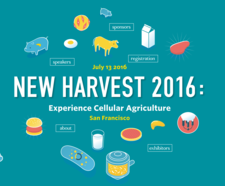Future Now
The IFTF Blog
IFTF at New Harvest 2016: Beef, Pork, and Chicken from Cell Culture

In July I joined leading global experts in tissue engineering to discuss the future of cultured beef, pork, and chicken, and the impact on the food system at New Harvest 2016, the world's first cellular agriculture conference:
- Mark Post, creator of the world's first lab-grown hamburger
- Marianne Ellis, who focuses on designing and fabricating bioreactors for large-scale cell culture
- Paul Mozdziak, a professor of advanced animal cell culture techniques.
The experts explore breakthroughs in biology, biomanufacturing technologies, the convergence of engineering disciplines in this "absolutely multidisciplinary" emerging field, and the funding needed to scale agriculture from cell culture. What does scaling up cultured protein look like? How can we structure government, industry, regulation, and society for a future of cellular agriculture? What is the relationship between traditional and cellular agriculture?
For More Information
About New Harvest 2016: View all speaker videos from New Harvest 2016 and relive the discussion at #NewHarvest2016.
About IFTF's forecasts: Over the past few years, IFTF has explored different approaches to transforming protein, biodesign in the food system, and a bio:made future—where the tech revolution meets the biology revolution. More IFTF forecasts and resources:
- Our Food Futures Lab's 2013 forecast map, Seeds of Disruption: How Technology is Remaking the Future of Food
- Our 2013 Artifact from the Future: Meat Counter, which explores a future in which many more protein options are available at your local grocery store
- Our Technology Futures Lab's 2015 Exhibit of Bio:Made Creations of the Future
About the Food Futures Lab

IFTF’s Food Futures Lab identifies and catalyzes the world-changing innovations that have the potential to reinvent our global food systems. We use a suite of methodologies to systematically envision future possibilities, and draw insights to drive action today. We align the minds, innovations, and resources shaping the future of food with a long-term perspective. The Food Futures Lab challenges assumptions and reveals new opportunities to make a resilient, equitable, and delicious future of food.



